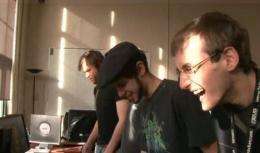No flaw safe from Montreal's game glitch hunters

A group of tech-savvy young gamers gather in a Montreal loft, drawn by a love for computer games and their well-honed skills for ridding them of potentially fatal glitches and flaws.
These young adults are part of a new breed of bug hunters who look for pesky programming errors that can crash video games and cost the industry millions of dollars in lost revenues.
"We have a good laugh," said Johnathan, one of the group of game testers who mostly are young people in their early 20s.
In the room filled with rapid mouse clicks and bright computer screens, Johnathan said the job is anything but fun and games.
"This is still work that is serious," he said.
"We have to find the bug. We have to find where the bug is coming from."
The company Johnathan works for, Bug-Tracker, was created in France in 1998 by Antoine Carre, a programmer and self-described "gadget lover".
"People thought I was crazy. Being a tester wasn't a profession," said Carre, who moved to Montreal -- a regional hub for software developers -- because of the province's reputation for skilled, creative talent and generous government tax breaks.
Testers with highly-developed hand-eye coordination are as essential to the industry as software developers. Before games and multi-media programs hit the retail shelves, they must go through rigorous testing for programming glitches.
"There is a difference between what a developer programs, from a logical standpoint, and what a user, from an illogical standpoint, actually does," Carre explained.
"We are the interface between those worlds," he said.
Montreal has come to be a fertile environment a computer gaming industry, which has exploded in recent years.
"In just a few years, Montreal has gone from 800 jobs in the video game industry to more than 9,000," said Carre.
He said Bug-Tracker, which has offices in Paris and in Chengdu, China, and is expected to open an office shortly in Tokyo, works with up to 70 clients in 26 countries, juggling as many as 400 projects at a time, and registering a turnover of five million euros (6.8 million dollars) per year.
Its big name clients include Ubisoft, Electronic Arts, Nintendo, Microsoft and Sony.
While playing games may seem like a dream job, bug hunting can be exhausting. Depending on how complicated a game is, it can take anywhere from 3,000 to 8,000 hours of testing to get a prototype.
Testers, a versatile group, come from all different social backgrounds, work in 14 different languages, and are usually younger than 25 years old.
At Bug-Tracker, Italian testers rub shoulders with Polish interns and socially marginalized local youth -- all of whom are learning testing skills through a training program developed by Carre himself.
"I've been preaching for four years," he said of his efforts to rally government and community organizations to his cause of helping young people.
"For the last three years, our training targets dispossessed youth, people who have dropped out of school and social life," Carre explained.
Thanks to a program supported by the Quebec government and the non-profit group Integration Jeunesse, young jobless youth are given a six-month training at Bug-Tracker.
David Bilodeau, one of Carre's students, said the work is fun, but can be grueling.
Before he got the job he said he would spend "20 hours a day in front of my computer. I slept as little as possible and played as much as possible."
Now even though he is poorly paid, his job at Bug Tracker has enabled him to re-enter the work force and dream about other jobs in the future, like being game designer or project manager.
The company is working on a number of platforms, including PS3, Xbox 360, and kinekt, Carre said.
"There's a really big push now, a strong demand for application tests and games on iPad, iPod, iPhone, and also an Android phone (a phone with an operating system developed by Google)," Carre said.
At its busiest, Bug-Tracker employs 400 testers on three continents, who are expected to spend a thousand hours looking for all kinds of anomalies.
The trade demands strict confidentiality. To avoid the negative buzz over a potentially problematic video game, testers are not allowed to reveal the name of the games they're working on.
Some of bug hunters stay, some go on to work at Ubisoft, Electronic Arts and other software developers.
"This is what we're really proud of," said Carre. "We have created a trade and a network."
(c) 2011 AFP



















